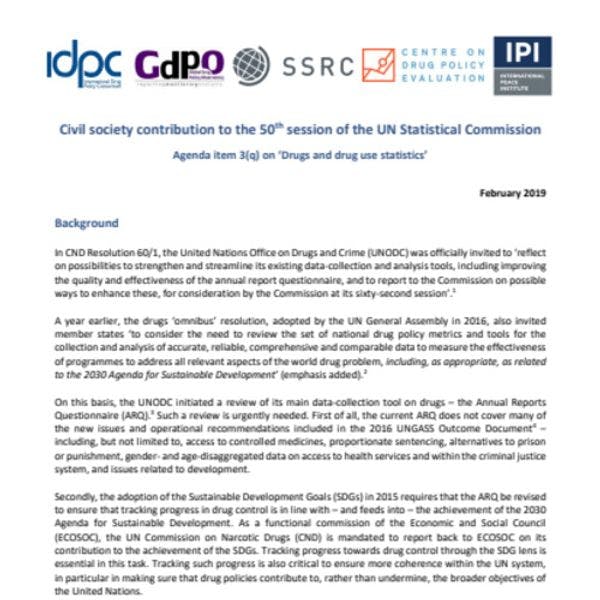Civil society contribution to the 50th session of the UN Statistical Commission - Agenda item 3(q) on ‘Drugs and drug use statistics’
By the International Drug Policy Consortium (IDPC), the Global Drug Policy Observatory - Swansea University (GDPO), the Drugs, Security and Democracy Program - Social Science Research Council (DSD-SSRC), the Centre on Drug Policy Evaluation (CDPE), the International Peace Institute (IPI)
In CND Resolution 60/1, the United Nations Office on Drugs and Crime (UNODC) was officially invited to ‘reflect on possibilities to strengthen and streamline its existing data-collection and analysis tools, including improving the quality and effectiveness of the annual report questionnaire, and to report to the Commission on possible ways to enhance these, for consideration by the Commission at its sixty-second session’.
A year earlier, the drugs ‘omnibus’ resolution, adopted by the UN General Assembly in 2016, also invited member states ‘to consider the need to review the set of national drug policy metrics and tools for the collection and analysis of accurate, reliable, comprehensive and comparable data to measure the effectiveness of programmes to address all relevant aspects of the world drug problem, including, as appropriate, as related to the 2030 Agenda for Sustainable Development’ (emphasis added).
On this basis, the UNODC initiated a review of its main data-collection tool on drugs – the Annual Reports Questionnaire (ARQ). Such a review is urgently needed. First of all, the current ARQ does not cover many of the new issues and operational recommendations included in the 2016 UNGASS Outcome Document – including, but not limited to, access to controlled medicines, proportionate sentencing, alternatives to prison or punishment, gender- and age-disaggregated data on access to health services and within the criminal justice system, and issues related to development.
Secondly, the adoption of the Sustainable Development Goals (SDGs) in 2015 requires that the ARQ be revised to ensure that tracking progress in drug control is in line with – and feeds into – the achievement of the 2030 Agenda for Sustainable Development. As a functional commission of the Economic and Social Council (ECOSOC), the UN Commission on Narcotic Drugs (CND) is mandated to report back to ECOSOC on its contribution to the achievement of the SDGs. Tracking progress towards drug control through the SDG lens is essential in this task. Tracking such progress is also critical to ensure more coherence within the UN system, in particular in making sure that drug policies contribute to, rather than undermine, the broader objectives of the United Nations.
Thirdly, a simplification and streamlining of drug-related indicators is urgently needed to increase the response rate to the ARQ, especially in Africa, Latin America and Asia.
The UNODC kicked off the ARQ review process at an expert working group meeting on 29th to 31st January 2018, to discuss quality, gaps and challenges in data collection. However, the meeting fell short of a meaningful reconsideration of the ARQ, and little discussion took place on how to incorporate UNGASS implementation and the achievement of the SDGs in a revised version of the ARQ. IDPC raised these and other concerns in a letter which was eventually shared by the UNODC to the participants of the meeting.
Downloads
Topics
Regions
Related Profiles
- Centre on Drug Policy Evaluation (CDPE)
- Drugs, Security and Democracy Program (DSD) - SSRC
- Global Drug Policy Observatory (GDPO)
- International Drug Policy Consortium (IDPC)
